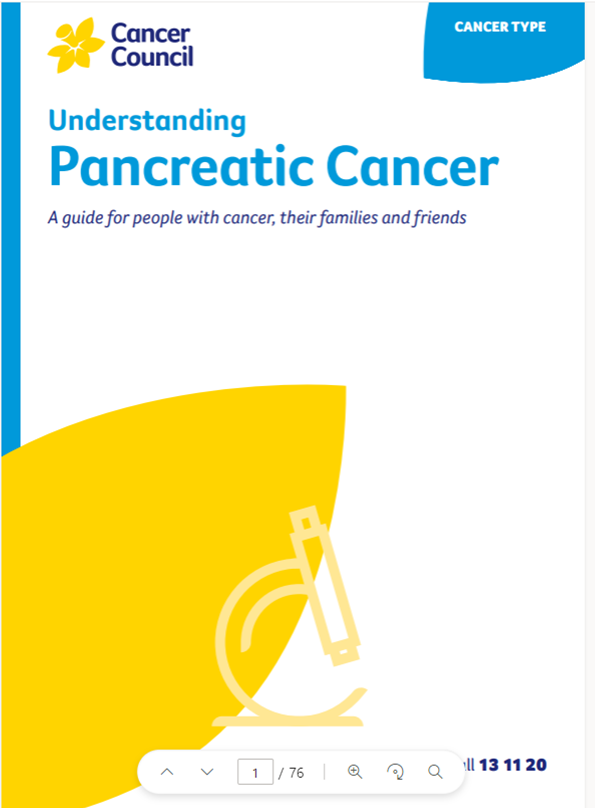- Home
- Pancreatic cancer
- Treatment to manage cancer and symptoms
Treatment to manage cancer and symptoms
In this section we look at the treatment options to manage pancreatic cancer and its symptom.
Learn more about:
- Overview
- Surgery to relieve symptoms
- Chemotherapy
- Radiation therapy
- Targeted therapy and immunotherapy
- Palliative treatment
- Video: Treating pancreatic cancer
Overview
Pancreatic cancer usually has no symptoms in its early stages, so many people are diagnosed when the cancer is advanced. If the cancer involves nearby organs or blood vessels (locally advanced – some stage 3 cancers) or has spread to other parts of the body (metastasised – all stage 4 cancers), surgery to remove the cancer may not be possible. Instead, treatments will focus on shrinking or slowing the growth of the cancer and relieving symptoms without trying to cure the disease. This is called palliative treatment.
Some people think that palliative treatment is only offered at the end of life. However, it can help at any stage of pancreatic cancer. It does not mean giving up hope – rather, it is about managing symptoms and living as fully and comfortably as possible. Palliative treatment is one aspect of palliative care. Many studies have shown that when palliative care is delivered early it can improve people’s quality of life.
Palliative treatments may include surgery, chemotherapy and radiation therapy, either on their own or in combination.
These treatments may be used to help manage the cancer and relieve some common symptoms of advanced pancreatic cancer, such as:
- jaundice caused by narrowing of the common bile duct
- ongoing vomiting and weight loss caused by a blockage in the stomach or small bowel
- pain in the abdomen (belly) and middle back.
Many people with advanced pancreatic cancer have digestive problems. For example, a blockage in the pancreatic duct can stop the flow of the digestive enzymes required to break down food. This can be treated with pancreatic enzyme supplements.
Learn ways to change your diet to help manage some common problems.
Managing pain in pancreatic cancer
If pain becomes an issue, you may need a combination of treatments achieve good pain control. Options for relieving pain may include:
- strong pain medicines such as opioids
- nerve blocks – when anaesthetic or alcohol is injected into nerves
- anticonvulsant medicines to help control nerve pain
- chemotherapy and/or radiation therapy to shrink cancer pressing on nerves
- complementary therapies such as acupuncture, massage and relaxation techniques.
Tell your treatment team if you have any pain, as it is easier to control when treated early. Don’t wait until the pain is severe.
Your team can also refer you to a pain specialist or palliative care specialist if needed.
For more on this, see Pain and cancer or listen to our podcast on Managing Cancer Pain.
→ READ MORE: Surgery to relieve symptoms
Video: Treating pancreatic cancer
In this video experts explain how groundbreaking treatments for pancreatic cancer are offering new hope to patients and improving survival rates.
More resources
Prof Lorraine Chantrill, Honorary Clinical Professor, University of Wollongong, and Head of Department, Medical Oncology, Illawarra Shoalhaven Local Health District, NSW; Karen Baker, Consumer; Michelle Denham, 13 11 20 Consultant, Cancer Council WA; Prof Anthony J Gill, Surgical Pathologist, Royal North Shore Hospital and The University of Sydney, NSW; A/Prof Koroush Haghighi, Liver, Pancreas and Upper Gastrointestinal Surgeon, Prince of Wales and St Vincent’s Hospitals, NSW; Dr Meredith Johnston, Radiation Oncologist, Liverpool and Campbelltown Hospitals, NSW; Dr Brett Knowles, Hepato-Pancreato-Biliary and General Surgeon, Royal Melbourne Hospital, Peter MacCallum Cancer Centre, and St Vincent’s Hospital, VIC; Rachael Mackie, Upper GI – Clinical Nurse Consultant, Peter MacCallum Cancer Centre, VIC; Prof Jennifer Philip, Chair of Palliative Care, University of Melbourne, and Palliative Medicine Physician, St Vincent’s Hospital, Peter MacCallum Cancer Centre and Royal Melbourne Hospital, VIC; Lucy Pollerd, Social Worker, Peter MacCallum Cancer Centre, VIC; Rose Rocca, Senior Clinical Dietitian – Upper GI, Peter MacCallum Cancer Centre, VIC; Stefanie Simnadis, Clinical Dietitian, St John of God Subiaco Hospital, WA.
View the Cancer Council NSW editorial policy.
View all publications or call 13 11 20 for free printed copies.

